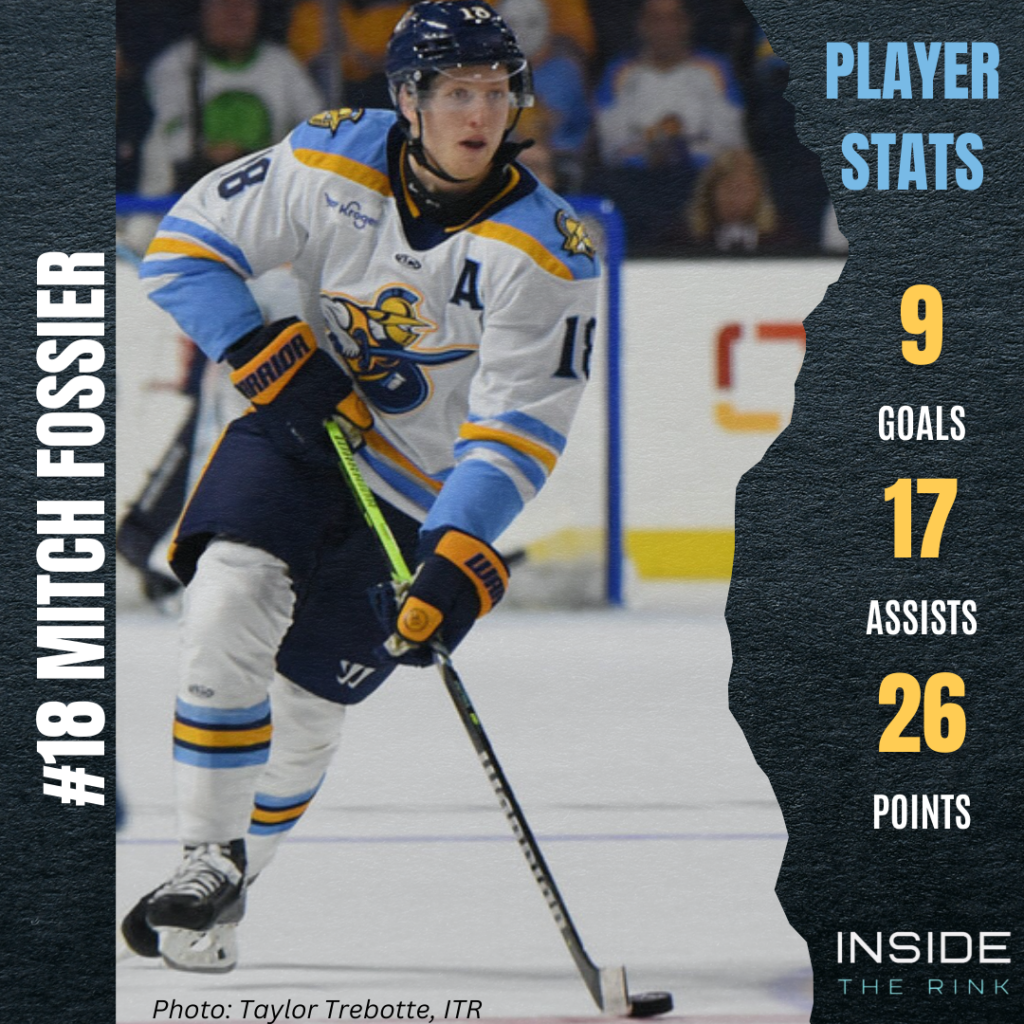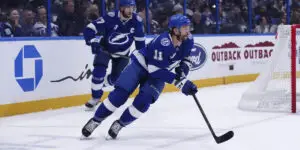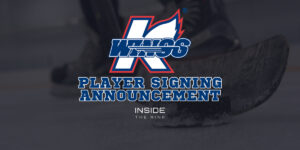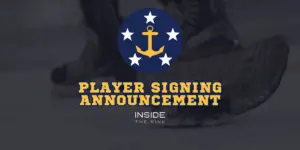
When I began writing for Inside the Rink, I knew that I wanted to facilitate a deeper connection between the fans and players. My goal was to move beyond just writing about the players’ statistics and/or their influence on the team’s performance. I truly believe every player who steps onto the ice has a unique story to tell, a personal history worth sharing, and hobbies or interests that deserve recognition.
In today’s player profile, we are thrilled to feature Mitch Fossier, forward for the Atlanta Gladiators. We are grateful for Mitch’s willingness to share his unique story with us, including his love for both hockey and music.
HOCKEY
Mitch, we do share this in common – Maine – I was born there. It appears that you had a fantastic experience during your time in Maine and still have strong connections to the area. Would you mind sharing some things you miss about playing hockey and living in Maine?
I have nothing but good memories from my time in Maine. As you alluded to, I spent four years at the University of Maine playing hockey under the late coach Red Gendron. Playing at the Alfond (Arena) was one of the most incredible experiences in my hockey career. That atmosphere and energy was unlike anywhere I’ve ever played. I also spent another year in the state of Maine, playing in Portland for the Mariners. Portland was maybe my favorite place I’ve lived to play hockey. Was fortunate to live right off Casco Bay on the coast, which was ten minutes from downtown. There are so many incredible restaurants, bars, and shops, all within walking distance off of cobblestone streets and sidewalks all over. It had such a cool and unique feel. I met so many great people and good friends during my time in Maine, too – feels like a second home in many ways.
Upon returning to your home state of Georgia, what was the first thing you had to do or place you had to visit outside of seeing friends/family?
I’ve been fortunate to always be able to come back to Georgia in the offseason and spend my summers here. I still have lots of friends from growing up who live in the area, so they tend to keep me busy all summer! I love it here, and it still just feels like home. It’s always so much fun upon my return to Georgia to play music. I’m super fortunate to have some good friends in the area who are fantastic musicians, so that’s always high on the to-do list when I first come home.
Putting on my college hat a bit, what did you study while at the University of Maine? And why did you choose that major?
I was a News Media Major at UMaine, which was essentially the closest thing I could do to audio production. That major gave me access to studios and included audio courses that were of interest to me with recording and producing my own music. The major itself, though, included a wide array of creative fields (Audio, Video, Photography, Coding, Animation, design, UI, etc.) So, I definitely had to branch out in some areas that I probably wouldn’t have otherwise.
Who is your favorite hockey player, past or present, and what are the reasons behind your choice?
It’s probably pretty basic, but I always loved watching Crosby growing up. I also loved Marian Hossa on the Thrashers, just being from Atlanta. There are so many good players in today’s game, though, that are a lot of fun to watch and learn from.
Recently, the team attended an event to help kids learn more about hockey. What was that experience like for you, working with kids that may aspire to play the sport?
It’s always fun to get on the ice with young kids who are trying to figure it out. It’s a blast to watch the ones who start to fall in love with it. It brings me back to when I was a kid and brings back some of the same emotions and joy I had when I first started playing.
A sadder but still timely topic: Adam Johnson’s passing has struck a chord among the hockey community. How did you feel about that? Has it changed your perspective on player safety at all?
Obviously, it’s a tragic thing that happened. I’ve had lots of overlap, playing with and against many of the players that were present for the incident, and I can only imagine the horror of witnessing it. I think every player has thought about the player safety aspect, and I can’t say I have personally come to too many conclusions. Hockey is a very dynamic sport where a lot could go wrong. I think the incident does raise a lot of questions as far as equipment and what could be done to protect the players without hindering the game or performance.
With some of the recent games, the team has faced some challenges. As alternate captain, how have you tried to help your teammates get through them?
There’re two sides to it. As cliché as it sounds, I think you have to stay process-oriented and encourage players to be confident in what they’re doing on the ice, whether we’re losing or winning. It’s never fun to lose, and confidence plays such a large role in performance. At the same time, there is a standard that we as players have to play to, and we have to keep each other accountable. We have a lot of young guys on the team experiencing their first pro season. The pro schedule is a whole lot of games, and it can be daunting as a rookie. We have to find a way to play with consistency from shift to shift.

MUSIC
You released your album “Like We Were Told” recently on Spotify with an album cover that reminds me a lot of Maine. What was your inspiration behind the album and its cover?
The album is really a collection of songs I wrote throughout college, and even some ideas started prior to that. The songs incidentally have a theme of growing up and maybe growing into your own beliefs and standards. A lot of songs reference my childhood, and I spent a lot of my childhood playing in the woods with my brother and our friends. That’s what the album cover was inspired by.
“It’s Time” is one of my favorite singles. It’s interesting how the song manages to evoke both sadness and hope simultaneously – at least for me. Could you share the inspiration behind the lyrics and the overarching theme of the piece? What sort of emotions were you aiming to elicit in the listener when they heard it?
I don’t know if I ever really aim to elicit emotions in a listener. Rather, I think I’m just trying to encapsulate the way that I feel personally, and I suppose I hope people can relate. The song is pretty much about inner wrestle of ending a relationship and knowing the hurt you could cause a person that you still really care about and even love – maybe even the worry of coming off as a hypocrite in the process.
Can you share your favorite songs and elaborate on what makes them so special to you?
It’s always fun as a songwriter to see songs come to life as other musicians put their stamp on it with other instruments. “Run with the Pack” is one of my favorites because of the violin composition that Violin players Chris Gustin and Ryu Mitsuhashi played. They really made the song. There is also a recording of my grandmother, who passed away during the recording of the song, at the end of the track, that is a really special memory to me.
Could you tell me which song on the album was the most challenging or difficult to write and what made it so difficult?
Give Me Some More was probably the most challenging to write and produce. I think it was a song that was a little different from most things that I had written at the time, and I didn’t quite know how to make it come to life. Most songs I had written leading up to that were written on an acoustic guitar and were more folky. That one has more of a rocky undertone, and it was new for me.
How long did the album take you to write and produce? Any plans to produce another?
The album took me far, far too long to produce! The songs were written in college, and I started recording in between my junior and senior year at UMaine. I actually originally finished the album right after college and was very unhappy with it. Going through the whole process definitely exposed some of my shortcomings and incompetence in engineering. I ended up reengineering everything and re-tracking certain elements of the songs. It took me about four years from the time I started recording to finish it. Although a lot of that time was spent just learning and becoming better at the technical side of things. That, along with hockey and traveling eating up most of my time, it became a much longer process than I’d like to admit!
I definitely have plans to produce more music. I think it’ll be a much more enjoyable process this time around now that I have a much better idea of what I’m doing. I’ve written many songs in the last few years that I’m very excited to record and release. I’ll be back in the studio this summer.
The team has been very supportive of your music, having played your songs during both away/home games? What has that support meant to you both as a professional hockey player and as a musician?
It’s been super encouraging. Obviously, they certainly don’t have to promote or support my music, yet they have. So, that’s been cool to see, and I’m grateful for it.
This applies to both hockey and music – what are some of your favorite pre-game hype songs?
I’m definitely in the minority here, but I’ve never been much of a hype song kind of guy! I just want to be listening to something I enjoy, independent of the pace of the song. Naturally, I most certainly do not run the music before games! HA!
Want to listen to Mitch Fossier’s album “Like We Were Told”? You may find it on Spotify, linked below:
Discover more from Inside The Rink
Subscribe to get the latest posts sent to your email.



